Beth Tabler's Blog, page 191
May 8, 2022
6 Reasons Why – The Shadow Campaigns by Django Wexler
Hello again dear reader/listener, today I offer you something a little different from a review. The reason being that I am currently re-reading one of my favorite series, and I thought, rather than review the single installments of it now for Before We Go, why don’t I share some reasons why you should read this kick-ass series I’ve enjoyed so much!
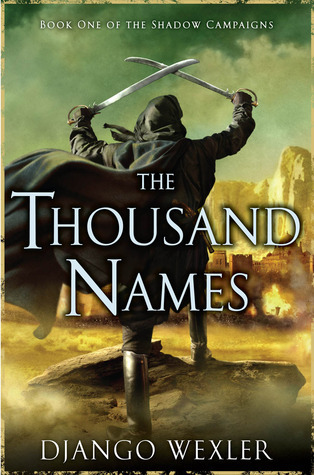 The Shadow Campaigns is a five-book series, whose first installment, The Thousand Names, I first found four years ago in a Barcelona bookstore. “But Eleni, you went to visit Spain to get books in English?” Well, you see, my best friend who was hosting me at the time set me loose in a bookstore and said, “find yourself a b-day present, on me”. By the time I returned home two days later I’d gotten half-way through and ordered the rest of the series in one go to then binge read over little less than three weeks. Let me share why:
The Shadow Campaigns is a five-book series, whose first installment, The Thousand Names, I first found four years ago in a Barcelona bookstore. “But Eleni, you went to visit Spain to get books in English?” Well, you see, my best friend who was hosting me at the time set me loose in a bookstore and said, “find yourself a b-day present, on me”. By the time I returned home two days later I’d gotten half-way through and ordered the rest of the series in one go to then binge read over little less than three weeks. Let me share why:
If you, like me, enjoy gunpowder fantasy, ala Powder Mage for instance, this is definitely the series for you. Wexler creates some of the most enthralling ambiance I’ve read, and mainly because he renders it in a way that develops along with his characters throughout the story. What I mean by this is that, through a use of multiple POVs that each have different levels of experience with the various military/combat/tactical situations, the reader really feels as if they’re in it in the moment along with these characters. Marcus has seen more combat than Winter, by the start of the story for instance, so his first impact with a skirmish or a bigger engagement is far different than Winter’s comparatively newbie impressions. He looks for tactical advantages to turn a situation around, while Winter is scrambling to find ways to simply get her men through that first engagement alive. As she learns the ins and outs of musket, bayonet, and cannon battles though, she learns how to work around the gunpowder smoke blanketing the battlefields.
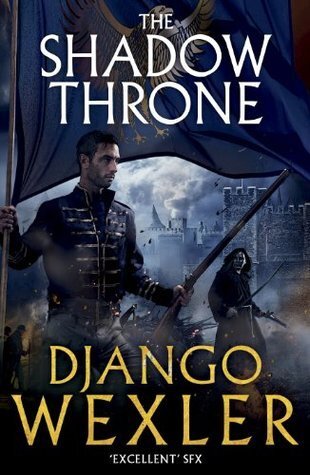 This is something which keeps the narrative engaging and riveting, especially during climactic scenes where all POV characters share the screen from different angles, to offer a full 360 view of the action. Later with the addition of Raesinia’s viewpoint, we are introduced to someone who is not battle savvy but has a mind for politics and machinations, among other things, which further adds another layer to the whole experience.
This is something which keeps the narrative engaging and riveting, especially during climactic scenes where all POV characters share the screen from different angles, to offer a full 360 view of the action. Later with the addition of Raesinia’s viewpoint, we are introduced to someone who is not battle savvy but has a mind for politics and machinations, among other things, which further adds another layer to the whole experience.
History Easter Eggs:
“You got rid of him?”
“For the moment,” Winter said. “Nothing confuses an officer like violently agreeing with him.”
― Django Wexler, The Thousand Names
Wexler borrows a lot from the Napoleonic Wars and the French Revolution, but he makes sure to make them his own in a way that assures his plot isn’t predictable to those who know their history. That said, catching the various real-life history easter eggs that are present throughout, be it for figures/people or events, is a lot of good fun, especially if that is something you enjoy doing when reading fantasy. I’ve no doubt missed a few myself which only makes me want to study the period again!
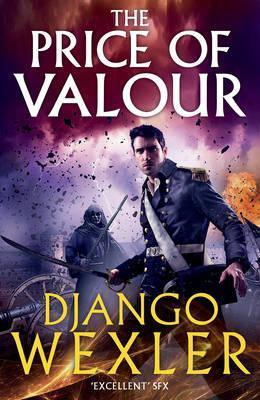 An Array of Incredible Characters:
An Array of Incredible Characters:The protagonists of these books are some of my all-time favorites and that is because they are written so dang well! Marcus, Raesinia, and Winter are all three reluctant heroes who step up when called, and they deliver to the best of their respective abilities. They are all also very done with their lot and following their inner monologues is some of the most fun you can have, through a mix of wry humor, self-deprecating, or leaning into their own personal melodrama, but most of all, with three different flavours of sass. What I love most about all of them is that they’re not perfect either, they are genuine, they have to adapt and change their ideas and beliefs when misguided or naïve, and that sort of development is always chef’s kiss to me. Especially because it means there are a lot of feels involved. Plus with Winter we have the added fun and tension of her being a woman pretending to be a man in order to be part of the army. The amount of edge-of-your-seat moments that revolve around her identity being revealed or not, or the unintended hilarity of certain moments and situations because of her hidden gender, are some of the passages I look back at the most fondly.
To accompany and complement the protags, the cast of side characters is wide and fleshed out in a manner that makes you miss them from the page when they’re not there, and/or cheer and exult when they reappear. Not everyone makes it to the end in one piece either and I still haven’t recovered from it, especially for a few of the truly unexpected ones that I am definitely *not* looking forward to mourning for again as I go through my reread… but I digress. They are fictional characters damnit! I should not grow this attached. Said every reader ever, as we lie to ourselves.
 Special mention also goes to the fact that, back when I was first starting on adult SFF, this was among the very first series I read with LGBTQ+ rep, that felt organically incorporated into the story as it should, and not existing for token action (or ahem fetish crap) purposes.
Special mention also goes to the fact that, back when I was first starting on adult SFF, this was among the very first series I read with LGBTQ+ rep, that felt organically incorporated into the story as it should, and not existing for token action (or ahem fetish crap) purposes.
“He expects me turn up for the inspection, glance through all of this, and then scurry back to Ohnlei to get on with my life. Marcus gave a rueful smile. More fool him. He doesn’t know I haven’t got a life.”
― Django Wexler, The Shadow Throne
The Magic System is a right mix of intriguing, eerie, and badass:
While magic is perhaps not as prevalent at the very start of the series, it is nonetheless important and a relevant dimension to this world. As the plot unfolds so do our characters find themselves more and more steeped in a reality of dark magic and creatures that are kept in the realm of myth and hearsay for the wider populace. Following the progression with which our characters initially don’t even believe in magic, and then find themselves actively dealing with it in a way that nobody expected makes for some amazing story-telling, that gradually layers this rich setting and story with intrigue upon intrigue. I could go on, but I’d enter major spoilers territory and I’d never forgive myself if I ruined that effect for anyone.
One of the key aspects of this overall series is that the pace, tone, and settings change and evolve throughout the whole thing, so that each book brings something new and slightly different to the table, without changing so much that you miss what it was like before. Look at it like a Pokèmon evolution if you like; it keeps getting cooler, bigger, and stronger. For example, at a very mild spoiler, book one is relatively limited in scope as the whole thing takes place during a desert campaign essentially; simple, straight-cut military fantasy, with a touch of magic, and enough mystery to keep you turning the pages hoping to unravel it. With book two, The Shadow Throne, the scope widens a little more and even though the main action is in the capital city of Vordan, things stir elsewhere as well. The intrigue is now also political, economic, and magical. There are revolutionaries, armsmen, spies, nobility scrambling to hold onto waning power, and all the delicious conflict this all breeds when they all come to blows trying to out-manoeuvre each other. Finally, from book three onward, things change considerably again, as the plot unfolds over various countries and cities, the action grows exponentially in both coolness and tactical acrobatics, and the stakes become higher than ever for our characters.
“They both offered Winter crisp salutes, but the expression on their faces made her uncomfortable. It was the look of women meeting a legend. When did I become a legend?”
― Django Wexler, The Price of Valour
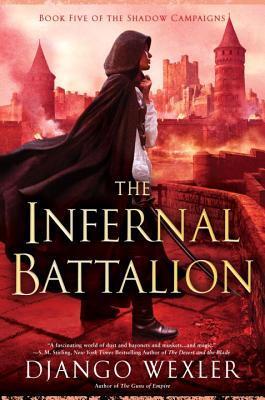 Janus bet Vhalnich:
Janus bet Vhalnich:That’s it. He’s a whole entire reason onto himself. No, I will not elaborate because you have to see for yourself. But trust me on this.
“A certain understanding passed between them, the shared feeling of men tasked with keeping a superior from absentmindedly killing himself. Marcus suppressed a smile.”
― Django Wexler, The Shadow Throne
Well, then dear reader/listener, I hope this short list piqued your interest enough to give this marvelously glorious series a go, and as always, I love discussing it more with anyone, so find me on Twitter where I’ll be more than happy to rave about it with you. Also, if you’d like me to write more posts like these, maybe even on your recommendations, please do let me know! This was fun and I’m very likely to do it again.
Until next time,
Eleni A. E.
Eleni Argyró Efstratiadou
*Post originally appeared on FanFi Addict
Check Out The Full SeriesThe post 6 Reasons Why – The Shadow Campaigns by Django Wexler appeared first on BEFOREWEGOBLOG.
Review – The Batman
THE BATMAN is a movie I approached with some trepidation because while I am a die-hard caped crusader fan, I even watched the Keaton movie as the date movie I proposed to my wife during, I had some issues for this one. It was a movie made without Ben Affleck, it was yet another “darker and grittier” reboot, and Robert Pattison was an unknown quality despite (and perhaps because of) his most famous role as Edward Cullen.
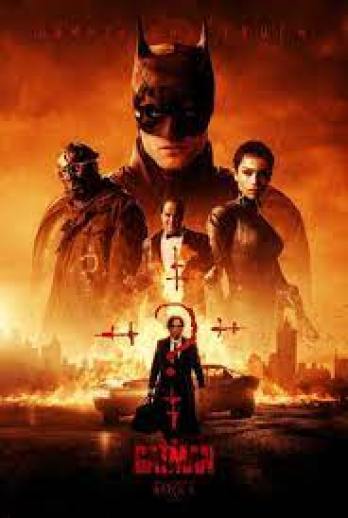 So, what did I think of The Batman? Overall, my impression is incredibly positive. Pattison chose to do a non-traditional version of Bruce Wayne that reminded me of the Crow than Batman but that doesn’t mean it’s a bad choice. He’s an emo, reclusive, and disturbed man who is more Tim Burton’s Batman than the actual Tim Burton’s Batman. Admittedly, it does kind of make the humorous plot hole of, “Who would I think is Batman in Gotham City?” “I dunno, the obviously unhinged billionaire who looks like a vampire and acts like a serial killer.”
So, what did I think of The Batman? Overall, my impression is incredibly positive. Pattison chose to do a non-traditional version of Bruce Wayne that reminded me of the Crow than Batman but that doesn’t mean it’s a bad choice. He’s an emo, reclusive, and disturbed man who is more Tim Burton’s Batman than the actual Tim Burton’s Batman. Admittedly, it does kind of make the humorous plot hole of, “Who would I think is Batman in Gotham City?” “I dunno, the obviously unhinged billionaire who looks like a vampire and acts like a serial killer.”
The movie is perhaps a bit too long at three hours but this is one of those rare films that I will say benefits from fully realizing its vision. It feels more like a miniseries rather than a movie and that’s not an insult. We get to experience a Gotham City that feels genuinely dirty, sleazy, and impoverished to the point that it needs a Batman. It has a strong 1970s New York vibe and yet manages to incorporate topical subjects like internet-based conspiracy theories.
The Batman is more or less a companion piece to the Joker and I really think they should get a crossover with Waukeen Phoenix. This is effectively the same city that draws on a lot of the same sources with Raging Bull, Taxi Driver, and the more modern Seven to create a superhero movie that feels instead like an arthouse crime piece. If that’s what you’re looking for with your Batman, then that’s definitely what you’re going to get here. Those looking for a lighter-hearted MCU-esque take on the subject will be disappointed. This is darker than the Nolan Batman movies by a significant degree and closer to the Burton Batman without the cartoonish elements.
Part of the benefit for such a long movie is that we get to incorporate Catwoman, the Penguin, and the Riddler rather than focus on just one of Batman’s rogues. It’s always been possible to do this as we see with Batman Forever but the difference here is we get to incorporate them well. They’re not even the sole villains as there’s a decent-sized role for Carmine Falcone as well. Given I’m a huge fan of The Long Halloween, I always enjoy his incorporation into the Batman mythos and he serves as a nice antagonist for Selina Kyle.
 Speaking of Selina Kyle, Zoe Kravitz is one of my all-time favorite actresses and I absolutely love her in everything she’s in. She even made The Crimes of Grindelwald tolerable for me. Here, she’s a very humanized down-to-Earth Catwoman and I absolutely want to see more of her. Indeed, I would go so far to say that she’s the first Catwoman I actually felt a romantic connection between Batman with. One I could believe in. She’s not quite Catwoman yet but is certainly on the way to becoming her.
Speaking of Selina Kyle, Zoe Kravitz is one of my all-time favorite actresses and I absolutely love her in everything she’s in. She even made The Crimes of Grindelwald tolerable for me. Here, she’s a very humanized down-to-Earth Catwoman and I absolutely want to see more of her. Indeed, I would go so far to say that she’s the first Catwoman I actually felt a romantic connection between Batman with. One I could believe in. She’s not quite Catwoman yet but is certainly on the way to becoming her.
Much has been made of Colin Farell’s Penguin and he really does look like he stepped out of a classic Denny O’Neil comic book. The character doesn’t get to do much but his slimeliness, corruption, and lack of threat in places reminded me of the one from the comic book. I’ve heard they’re making a Penguin television series on HBO and I’d definitely watch it. He’s also part of one of the best car chases I’ve seen on camera.
The Riddler’s use in this movie is heavily inspired by the Zodiac killer, John Doe from Seven, and quite a bit of Jigsaw. Some viewers have mentioned that he also seems to be incorporating a bit of Qanon but people allergic to politics in their views can be reassured it’s only surface-deep the way the Joker and Antifa was in Joker. The movie doesn’t spell out his origin but it’s pretty easy to figure out how he ties to the central mystery as well. In that respect, he’s more of a Hush and Riddler hybrid but without Thomas Elliot’s suckitude.
I normally favor a Riddler who is not terrifying and more of an anti-villain but this version works extremely well. By the time they finally catch up to the Riddler, they find he’s…a guy who looks like an accountant. It’s very effective and does a great job establishing that he’s someone who also has learned the lesson about theatricality and superstition that Batman has.
 One element I really enjoyed about this movie is also the fact the movie is not afraid to interrogate who the Batman is and how effective he is. Bruce Wayne does his best to terrify criminals in order to make it so they don’t commit crimes but he ends up inspiring people who don’t have nearly his level of restraint or just think it’s cool. “Escalation” as hinted by the Nolan Batman films but directly addressed here. The movie asks how much Bruce Wayne could do as a philanthropist and this version hasn’t yet decided to be both the punching fist as well as helping hand.
One element I really enjoyed about this movie is also the fact the movie is not afraid to interrogate who the Batman is and how effective he is. Bruce Wayne does his best to terrify criminals in order to make it so they don’t commit crimes but he ends up inspiring people who don’t have nearly his level of restraint or just think it’s cool. “Escalation” as hinted by the Nolan Batman films but directly addressed here. The movie asks how much Bruce Wayne could do as a philanthropist and this version hasn’t yet decided to be both the punching fist as well as helping hand.
Do I have some complaints? A few minor ones. As stated, the movie is written more like a television series and I feel like they could have tightened it up by about thirty minutes and incorporated details into the sequel. If your movie is three hours long, you frankly have two decent-sized movies already and maybe we should get back to that. The Batman also absorbs inhuman amounts of punishment that kind of hurt my suspension of disbelief in places. Unless the Batsuit is made of vibranium, it shouldn’t absorb that much in the way of gunfire after all. Finally, the movie is literally too dark in places and could have been brightened so we could appreciate what’s on display. But these don’t really detract from my enjoyment factor.
9/10
The post Review – The Batman appeared first on BEFOREWEGOBLOG.
May 7, 2022
This is an Inspiring Step Forward

Hulu’s The Dropout is a docudrama about Elizabeth Holmes and her company, Theranos. So many people, including Holmes’s mother, are afraid of needles when their blood is drawn; so, so much blood. Barbaric. Theranos’s revolutionary, portable devices would allow to perform hundreds of rapid blood tests, using just one drop taken from the fingertip. When? Oh, soon, very soon. In 2011. Actually more like 2012. Make it 2013. Also maybe it would be a few drops of blood and sometimes there would be needles. There would be no FDA approvals or lab inspections, though. And sometimes the results would be incorrect, including HIV test results and cancer markers, sending people to the emergency room and (because America) costing them thousands of dollars.
In 2014, Theranos was valued at $9 billion. In 2015, soon after Forbes named Holmes the youngest ever self-made female billionaire in America, The Wall Street Journal exposed Theranos for what it was: a fraud. (The article’s publication coincided with Holmes attending a meeting of the Harvard’s Medical School Board of Fellows, of which she was now a member.) Forbes soon revised its estimate of Holmes’s net worth to zero. But the story took much longer to end.
The Dropout portrays the relentless pursuit of one’s dream, sexism in business and science, greedy lying journalists, glass ceilings, selflessly devoting time and money (other people’s) to making the world a better place, and gradual loss of integrity.
I mean, I guess, it could be about all those things. Or maybe some. I don’t remember exactly. I– I don’t recall that. I don’t remember. This was many years ago. I wouldn’t be able… no, I don’t specifically…
*
Holmes pitched her first big idea to her Stanford professor of medicine, Dr. Gardner. Gardner explained why it was impossible, which was not what Elizabeth came for. Confronted with Master Yoda himself – “do or do not, there is no try” – the irritated Dr. Gardner replied that science was about trying and failing and trying and failing until you got a bit closer to success. She didn’t understand that Elizabeth had a world to change, and nothing was impossible with three things: 1) time, 2) money, and 3) a vision. Time and money were related, and the tuition money Elizabeth would “save” by dropping out wouldn’t last her long.
 Visionaries are always misunderstood. Steve Jobs was told that his ideas would never work, they could never be mass produced, too expensive, too niche, and they simply had to fail. Of course Dr. Gardner wouldn’t get it – she wasn’t the next Steve Jobs, Holmes was. (Or, as Henry Kissinger would say later during Elizabeth’s 30th birthday party, Jobs would be an earlier version of her.) “Do or do not, there is no try,” would become the first thing Theranos visitors would see upon entering the building. Poor, limited Dr. Gardner.
Visionaries are always misunderstood. Steve Jobs was told that his ideas would never work, they could never be mass produced, too expensive, too niche, and they simply had to fail. Of course Dr. Gardner wouldn’t get it – she wasn’t the next Steve Jobs, Holmes was. (Or, as Henry Kissinger would say later during Elizabeth’s 30th birthday party, Jobs would be an earlier version of her.) “Do or do not, there is no try,” would become the first thing Theranos visitors would see upon entering the building. Poor, limited Dr. Gardner.
Holmes was brave. She was there to disrupt the status quo. She’d (eventually) dress in black turtlenecks and speak in a baritone. She’d hire Apple’s industrial designers to make the Theranos device look special and Chiat/Day to advertise it. Her face and the brand would become synonymous. She’d divide and conquer, blow hot and cold, praise and threaten – exactly like Steve. Some engineers would be able to tell which chapter of Walter Isaacson’s biography of Jobs she was reading based on which period of Jobs’s career she was impersonating.
“This is what happens when you work to change things. First they think you’re crazy, then they fight you, and then all of a sudden you change the world,” Holmes would eventually say once the Wall Street Journal exposed two crucial differences between Theranos and Apple. First, Apple delivered. Second, iPhones could and did change people’s lives, but not by putting them at risk.
*
When the very first prototype delivered the very first result – an engineer tested negative for sepsis, which could have been correct or not, as most people in the world do not experience asymptomatic sepsis – Holmes set up a meeting with Novartis. As it turned out, after the one successful reading all the machine continued to produce was a message stating “ERROR/ERROR.” After a sleepless night filled with frustration, broken cartridges, and blood smeared all over the hotel bed sheets, Elizabeth solved the problem. Novartis would see a reproduction of that one successful (maybe) reading.
She didn’t cheat. Even if she did, it didn’t matter. It was, actually, the right thing to do. Visionaries needed time and money to change the world. Novartis was helping… no, scratch that, Holmes was letting them help. Novartis should be thankful.
It was the last time Elizabeth permitted herself to feel bad about lying. Drunk, she vomited behind rubbish bins, then shared the truth with Sunny Balwani, who would become her unofficial lover and official Chief Operating Officer of the company. “Don’t tell it to anyone else,” he instructed. As they drove away in his Lamborghini, Holmes stuck her head out of the window, yelling “I’m going to change the world!” She didn’t throw her integrity away. She threw it up.
This is an inspiring step forward, she’d later repeat to herself, staring intently into a mirror, after a fight with controlling Balwani.
*
The machine Elizabeth named “Edison” still didn’t work when Pfizer financed a trial on terminal cancer patients. The patients knew it was just a trial. Pfizer knew it was a trial. Trials often didn’t work – even Dr. Gardner would confirm that. It was science done right. It wasn’t unethical at all. It was fine, it was all fine, when Elizabeth held a dying woman’s hand and smiled shyly as the woman told her she was doing the right thing. She was dying anyway. Edison, once it worked, was the future she permitted Pfizer to finance.
When Dr Richard Fuisz, smart enough to patent something Theranos would eventually need, offered to license it to them for sweet $4 million, he was immediately sued. As part of his defence strategy Fuisz demanded a deposition from Ian Gibbons, the chief scientist of Theranos. Gibbons’s NDA meant that he’d either have to lie in court, or get sued by Theranos for revealing the truth. When he took an overdose the night before his testimony was supposed to take place, Elizabeth was stunned. “This is good news, right?” she asked Balwani in disbelief. “Now he won’t testify, they have to throw away the lawsuit?”
They threw away the lawsuit.
Fuisz settled. Theranos acknowledged Gibbons’s legacy and importance by sending people to retrieve his laptop and notes from his house as his wife sobbed. Elizabeth didn’t hand him the pills and the alcohol, he was a grown-up who made his own choices. His death contributed to making the future better for everyone. And the courage and stoicism with which Holmes handled the death of a man who supported her from the start, believed in her vision, and thought of her as a close friend could only be admired.
This is an inspiring step forward.
More steps forward had to be taken, and fast, because the company kept growing.
*
Every investor who dismissed Facebook and Twitter was afraid of missing out on the Next Big Thing. Theranos looked like it could be one. Careful timing of meetings with executives from big companies and Holmes’s blunt admission she was not courting any of them exclusively made it clear – the money people had to hurry up if they wanted to participate in the future. When Walgreens secured the first “Wellness Centres,” they actually were grateful.
As money kept flowing and Theranos’s board of directors grew, it became clear the Next Big Thing has arrived. Walgreens financed it. With a Stanford professor as a board member, clearly George Shultz, an ex-U.S. Secretary of State could trust Holmes. With Shultz on board, why would Henry Kissinger have doubts? With Kissinger on board, why…
The snowball was an avalanche now, a single drop – a waterfall. It wasn’t just Elizabeth who was convinced her vision would come true anymore. All of them wanted the bright future. Those were rich and powerful people. The sort of people who always got what they wanted.
The only minor problem was that it remained impossible.
*
How did Holmes do it? How did a college dropout convince so many people for so long that she “devised a way to perform up to 70 different blood tests using just 25 to 50 microliters of blood” with nothing to show as proof? So she had audacity, a black turtleneck, acting talent, no scruples, lied, cheated. Big deal. She was neither the first nor the last. How charming a liar and charismatic a cheat does a person have to be to see her company valued at nine billion dollars? Who has this much integrity to lose?
Nobody.
During a photo session, Elizabeth is asked some innocent questions, just so she could relax. “Tell us a secret.” – “I, uh, don’t have many secrets.” “How would a friend describe you?” – Holmes, who has no friends, blanks in panic. “You’re about to turn 30, has your life turned out the way you thought it would?” She needs a break.
“You are not real!” Balwani would eventually cry. “I invented you inside my head!” So did everyone else. The old white men didn’t buy investments in a medical startup – they paid for the privilege of seeing themselves reflected in Elizabeth’s huge eyes. Once more, they were young, energetic, brave. They were on the side of goodness. They didn’t just take an inspiring step forward – they ran.
 All Holmes – not just the next Jobs, but Newton, Einstein, Mozart, da Vinci, and later Rosa Parks and Marie Curie – had to do was tell the 90-year-old George Shultz: “you are a force of nature, and it’s inspiring just being in your presence.” She earned an ally for life, one who would later disown his grandson for doubting Elizabeth. Because now that she was the Next Big Thing, the elderly Shultz was too, by association, and so were others that followed. The board and the investors deceived themselves over and over again, and every time they announced Holmes was to be believed, she believed them, too.
All Holmes – not just the next Jobs, but Newton, Einstein, Mozart, da Vinci, and later Rosa Parks and Marie Curie – had to do was tell the 90-year-old George Shultz: “you are a force of nature, and it’s inspiring just being in your presence.” She earned an ally for life, one who would later disown his grandson for doubting Elizabeth. Because now that she was the Next Big Thing, the elderly Shultz was too, by association, and so were others that followed. The board and the investors deceived themselves over and over again, and every time they announced Holmes was to be believed, she believed them, too.
If you put two mirrors opposite each other, reflection run endless – and the only integrity a mirror understands is the difference between being broken or not.
*
When she is forced to apologise for the damage Theranos has done, Holmes’s lawyers advise her to use the word “devastated” – and she does. She is, specifically, devastated by the blow dealt to her company, one they will bounce from even stronger, one that will make her a better leader. “It’s devastating,” Holmes repeats to the speechless journalist, “but I don’t believe that we put anybody’s health in danger.” And it’s true. She really doesn’t believe it.
Once the disastrous interview ends, the exasperated lawyers long gone, Elizabeth sits in front of a mirror, her face a mask, eyes blank. Why is this even happening? After all, when she asked Balwani earlier on “do you think we did something wrong?” he was speechless. In retrospect, the question was silly.
Tell us a secret. Holmes has no answer. How would a friend describe you? She can’t think of anything. What’s your favourite food, Lizzy? her new boyfriend Billy asks, laughingly. Come on, there must be one! She doesn’t know.
Mirrors don’t know what they look like.
*
The real-life Elizabeth Holmes has been found guilty of four counts of wire fraud and conspiracy. The sentencing has been scheduled for September 26. Lizzy is facing twenty years in federal prison on top of multi-million fines and restitution. In 2021, she gave birth to her first child with Billy.
In the meantime she’s just taking a moment to enjoy herself and have fun, to quote The Dropout for one last time. I, for one, find that an inspiring step forward. The best thing about the future is that it’s always in front of you.
The post This is an Inspiring Step Forward appeared first on BEFOREWEGOBLOG.
Indie Cyberpunk Recommendations IV
Cyberpunk is a genre that hit its peak in the Eighties but has still carried on like the little Replicant that could ever since. Really, it’s now split between present-day cyberpunk (Watch_Dogs, Mr. Robot, Hackers) and far future experiences (The Expanse, Altered Carbon). However, I think the best place to find cyberpunk novels these days is the indie writing scene.
There’s something decidedly cyberpunk about going to writers not affiliated with the big corporations to get your fix about cybernetically enhanced humans, transhumanist themes, social satire, and street samurai action. Cyberpunk comes in many forms and just because we’re living in a world where everyone has a computer monitored by sinister corporate forces trying to sell us stuff doesn’t mean you can’t enjoy it still.
Five Recommended Indie Cyberpunk Novels
Five More Recommended Indie Cyberpunk Novels
Five Recommended Indie Cyberpunk Novels III
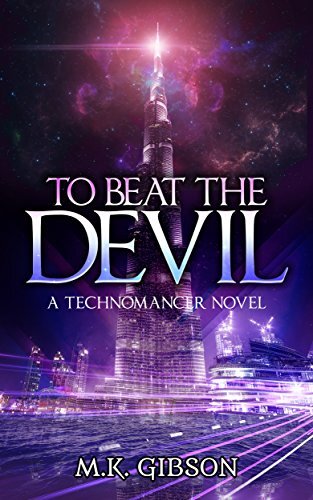 1. To Beat the Devil by Michael Gibson
1. To Beat the Devil by Michael GibsonMixing fantasy and cyberpunk is always a potentially volatile cocktail but sometimes it yields gangbuster results. The Technomancer series is up with Shadow Run for the latter. The Biblical apocalypse has happened, and God didn’t show up. As a result, demons now rule the world and humanity must live in their glittering technologically dominated dystopia. Salem is a courier trying to stay under the radar but ends up being recruited to be part of the resistance, whether he wants to be or not.
What is it About?
One hundred and seventy-five years have passed since god quit on mankind. Without his blessing, Hell itself, along with the ancient power of The Deep, were unleashed upon the world. Two world wars and oceans of blood later, a balance was reached. Demonkind took its place as the ruling aristocracy. Mankind, thanks to its ability to create, fell to the position of working proletariat. Alive, but not living. Lucky us. Welcome to New Golgotha, the east coast supercity. In it you will find sins and cyborgs, magic and mystery, vices without virtue, and hell without the hope of heaven. In the middle of it all is Salem, smuggler extraordinaire and immortal recluse, who has lived and fought through the last two centuries, but his biggest battle is just beginning. To Beat the Devil is an incredible adventure full of cyborgs and demons, gods, magic, guns, puns, and whiskey, humor, and heart. Follow Salem as he embarks to discover the meaning of the very nature of what mankind is: our souls. And who is trying to steal them.
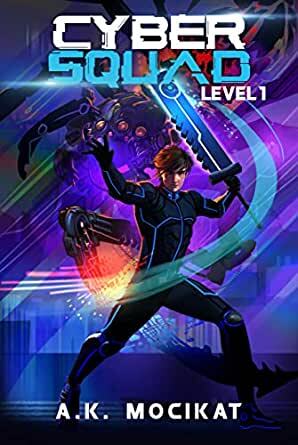 2. Cyber Squad: Level One by Anna Mocikat
2. Cyber Squad: Level One by Anna MocikatAnna Mocikat is someone that I truly love the cyberpunk works of but was wary of her diving into Lit-RPG. It’s just not a genre I jive with. However, I was pleased to see this fascinating story of a normal schlub getting recruited to be a virtual reality bug tester in the near future. It’s just that the bugs can kill you because the system is that realistic. Kai is determined to escape his life of grinding mediocrity and impress the girl of his dreams even if it gets him killed.
What is it About?Kai thought he had the best job in the world. Playing VR games for a living. Not if the games are trying to kill you. The Net is the last great frontier, a wilderness of data filled with mysteries beyond imagination. Bugs, a harmless annoyance in earlier decades, have become a deadly menace in times when gamers connect their brains directly to VR.
The Cyber Squad has been created to hunt them down. What used to be game QA in earlier times has become an elite, special force of the future, risking their lives to keep users safe. At first, joining the Cyber Squad seems like a dream job to Kai. He is paid well to be part of the coolest troop the gaming world has ever seen. But soon he discovers that the Net is a way scarier place than anyone would have suspected, and bugs are the smallest problem he and his team will have to face.
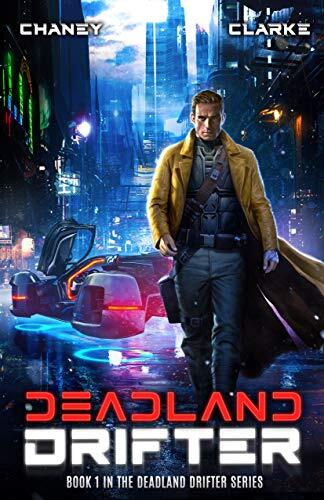 3. Deadland Drifter by J.N. Chaney
3. Deadland Drifter by J.N. ChaneyWhat if you had Jack Reacher in space? Jack Burner is a drifter who just wants to stay off the grid and out of the way of the military he used to serve. However, the world’s most incompetent terrorists recruit him forcibly during a dentist’s appointment gone wrong and send him on a mission to assassinate an admiral. It is a low-level crime drama in a corrupt dystopian society, it is more cyberpunk adjacent than cyberpunk, but I really enjoyed it. I also loved the sequels that have him do his best to dismantle a human trafficking operation with his oddball collection of fellow mercs,
What is it About?Deadland Drifter, book one
When a dental appointment goes sideways, former Union operative Jack Burner wakes to find himself drugged and imprisoned, and he’s given a choice: assassinate an admiral or be killed himself.
With no other option, Jack reluctantly accepts the mission, only to find himself being trailed by a mysterious blonde woman who may or may not want him dead. As if dealing with a terrorist group wasn’t enough.
With the fate of the admiral and thousands of lives hanging in the balance, Jack stands in the middle of an event that could ignite a war on the edge of the Deadlands and Union Space. Despite his exceptional abilities, training, and tenacity, even Jack has little to no chance of preventing this particular powder keg from exploding. He’s going to need a miracle.
Deadland Wanderer, book two
A mysterious message beckons Jack to a clandestine “meet”, but something is off. The code is identical to one his team used back in his Union days.
When no one shows, he and Sara find themselves drawn into an investigation to uncover who sent the message…and why.
It isn’t long before they find a trafficking ring that snatches women from shelters and wipes their memories, all with the hope of selling them to the rich and powerful as “wives”. But this is bigger than just a gang of criminals. There’s an organization that stretches across both sides of the law with connections to elected officials at the very top.
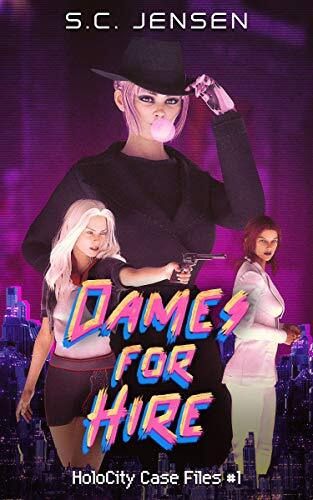 4. Dames for Hire by S.C. Jensen
4. Dames for Hire by S.C. JensenThe Bubbles in Space series is one I recommended earlier on this list but rapidly became an adventure series rather than one that stuck to dealing with noir style crimes in the future. The HoloCity Files series, which this is the first example of, is a detective series that remains focused on organized crime in the neon rain-soaked streets of HoloCity. I really enjoy these novellas because they are homages to the classic detective novels of the genre. Bubbles may be a terrible detective but there’s plenty of stupid criminals in the cyberpunk world she inhabits, so it all evens out.
What is it About?Dirty jobs call for dirty dames. But this is a bit much…
After a suspicious accident costs her a career, an arm, and nearly her life, Bubbles Marlowe needs all the help she can get.
When a friend asks her to do a little dirty work on the side, Bubbles isn’t prepared for just how dirty it’s going to get. An arrogant scientist, a young heiress, a gambling king pin, and a few too many hired guns…
Can Bubbles finish the case before it finishes her?
HoloCity’s femme fatales are out in full force in this cybernoir detective thriller. And these dames don’t mess around.
**Dames for Hire is the first stand alone mystery novella in the HoloCity Case Files series, a companion collection to the Bubbles in Space series. This is sci-fi noir for fans of Raymond Chandler and Dashiell Hammett, dark and gritty, with a healthy dose of acerbic humor.**
Blade Runner meets The Fifth Element in this eccentric cyber-noir thriller series about a bleak world ravaged by corrupt leaders, mega-corporations, and crime lords… and the washed-up detective who might be the only one crazy enough to take them on.
Bubbles in Space is a darkly funny mashup for fans of space opera, cyberpunk, and hard-boiled noir thrillers. Delve into the secrets of this gritty future world, and buckle up for an adventure full of unusual characters, dark humour, and non-stop action.
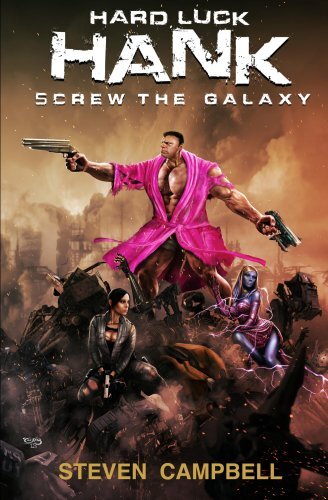 5. Hard Luck Hank by Steven Campbell
5. Hard Luck Hank by Steven CampbellAnother cyberpunk novel that is more cyberpunk adjacent than a pure example of the genre but stll it has all the grime as well as humor from a dystopian crime-ridden space station in a galaxy far-far away. Hank is a local thug in Belvaille, the absolute ass-end of the universe. He has no interests but eating and breaking heads but is probably smarter than the majority of criminals. He is also the absolute worst person you could recruit in a crisis but, unfortunately, he’s the only one they can recruit when the station becomes the center of a galactic crisis.
What is it About?Hank is a thug. He knows he’s a thug. He has no problem with that realization. In his view the galaxy has given him a gift: a mutation that allows him to withstand great deals of physical trauma. He puts his abilities to the best use possible and that isn’t by being a scientist. Besides, the space station Belvaille doesn’t need scientists. It is not, generally, a thinking person’s locale. It is the remotest habitation in the entire Colmarian Confederation. There is literally no reason to be there. Unless you are a criminal. Because of its location, Belvaille is populated with nothing but crooks. Every day is a series of power struggles between the crime bosses. Hank is an intrinsic part of this community as a premier gang negotiator. Not because he is eloquent or brilliant or an expert combatant, but because if you shoot him in the face he keeps on talking. Hank believes he has it pretty good until a beautiful and mysterious blue woman enters his life with a compelling job offer. Hank and Belvaille, so long out of public scrutiny, suddenly find themselves at the epicenter of the galaxy with a lot of very unwelcome attention.
The post Indie Cyberpunk Recommendations IV appeared first on BEFOREWEGOBLOG.
#BookCook Boeuf au Daube from To the Lighthouse by Virginia Woolf

“…an exquisite scent of olives and oil and juice rose from the great brown dish as Marthe, with a little flourish, took the cover off. The cook had spent three days over that dish. And she must take great care, Mrs. Ramsay thought, diving into the soft mass, to choose a specially tender piece for William Bankes. And she peered into the dish, with its shiny walls and its confusion of savoury brown and yellow meats and its bay leaves and its wine . . . ‘It is a triumph,’ said Mr. Banks, laying his knife down for a moment. He had eaten attentively. It was rich; it was tender. It was perfectly cooked.”
Something a little different this week.
Virginia Woolf had a way with words. The words in the above paragraph taken from To The Lighthouse are so succulent, so unctuous that they are practically dripping off of the page. It is a credit to her writing considering most times Woolf had to be coaxed to eat something due to her degrading mental health. I wonder what a writer like her would have accomplished had she not lived 100 years ago and got proper care for her mental health? We may have had more than the 8 books and a few dramas that she was able to pen.
Today’s recipe is Boeuf au Daube which translates to French Beef Burgundy or Beef Stew. The below recipe was taken from the fantastic website genius kitchen .

Image courtesy of Geniuskitchen.com
READY IN: 25hrs 30mins
SERVES: 8-12
UNITS: US
INGREDIENTS
5lbs prime beef, cubed & trimmed of fat
1 lb shallot, peeled
4 -6 garlic cloves, peeled & chopped finely
1 bunch fresh thyme
2 -4 bay leaves
750 ml Burgundy wine
1 -2 tablespoon olive oil
1 lb lardons, Smoked Bacon pieces
1⁄2 ounce dried cepes, soaked for 1 hr
6 -8 pieces dried orange peel, see method
1 tablespoon soft brown sugar
sea salt
fresh ground black pepper
1 -2 tablespoon cornflour, for thickening
2 tablespoons cognac
2 -4 sun-dried tomatoes, drained & chopped finely (optional)
1 (8 ounces) can chopped tomatoes(optional)

Image courtesy of Geniuskitchen.com
DIRECTIONS
Marinade the beef with the herbs, shallots & garlic overnight in the bottle of red wine.
Drain and put the wine to one side.
In a large skillet or frying pan, sear & brown the beef pieces over high heat in the olive oil until nutty & brown. Do not overcrowd the pan!
Place browned beef into the crockpot or cast iron Le Creuset Casserole Dish.
Fry the lardons or chopped bacon pieces until crispy & golden brown. Drain & add to the beef.
Brown the shallots & garlic in the bacon fat & add to the beef & bacon.
Add all the other ingredients, except the cornflour, to the crock pot including the reserved wine.
(Add the tinned tomatoes & sun-dried tomatoes at this stage too if you are using them.).
Cook on automatic or High for 4 hours and Low for up to 6 hours.
(For conventional cooking – pre-heat oven to 175 degs C or 325 degs F or gas mark 3 and cook SLOWLY for approximately 4 to 6 hours; check towards the end, the meat should be extremely tender – you MUST not be tempted to cook it quicker, it will be tough!).
Towards the end, blend & mix the cornflour with a couple of spoons of the stock in the crock pot & add to the beef, stirring well. It should not be TOO thick but just like a glaze or thickened jus. Add the cognac at this stage as well – stirring into the daube.
Serve with Green Beans, Mashed, Steamed or Pureed Potatoes during the colder months OR with a selection of salads, crusty French bread & Pasta during the warmer months. The excess sauce can be used or saved as a fantastic gravy or stock later!
THIS IS BETTER MADE 24 HOURS BEFORE EATING!
Freezes beautifully – I always make a large batch and then freeze some.
NOTE: If you cannot buy sun-dried orange peel, make your own, it’s VERY easy! Peel some oranges with a swivel head vegetable peeler or parer, be careful not to peel the pith. Spread outside on a rack in the full sun and leave to dry for about 2-4 hours. Weather permitting of course – otherwise dry in an airing cupboard or a very LOW oven overnight.Store in an airtight jar for up to 2 years.
If you are really stuck – just grate some fresh orange peel into the daube, it will not have the same intensity as dried peel, but it will work!
The post #BookCook Boeuf au Daube from To the Lighthouse by Virginia Woolf appeared first on BEFOREWEGOBLOG.
May 6, 2022
Review – Dungeon Crawler Carl by Matt Dinniman
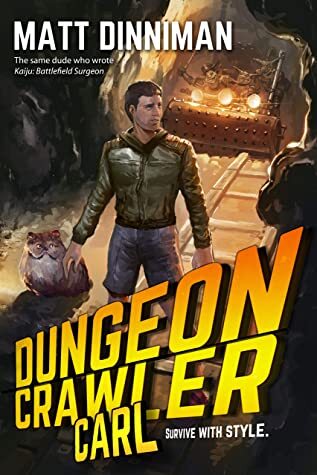 Synopsis
SynopsisA man. His ex-girlfriend’s cat. A sadistic game show unlike anything in the universe: a dungeon crawl where survival depends on killing your prey in the most entertaining way possible.
In a flash, every human-erected construction on Earth—from Buckingham Palace to the tiniest of sheds—collapses in a heap, sinking into the ground.
The buildings and all the people inside have all been atomized and transformed into the dungeon: an 18-level labyrinth filled with traps, monsters, and loot. A dungeon so enormous, it circles the entire globe.
Only a few dare venture inside. But once you’re in, you can’t get out. And what’s worse, each level has a time limit. You have but days to find a staircase to the next level down, or it’s game over. In this game, it’s not about your strength or your dexterity. It’s about your followers, your views. Your clout. It’s about building an audience and killing those goblins with style.
You can’t just survive here. You gotta survive big.
You gotta fight with vigor, with excitement. You gotta make them stand up and cheer. And if you do have that “it” factor, you may just find yourself with a following. That’s the only way to truly survive in this game—with the help of the loot boxes dropped upon you by the generous benefactors watching from across the galaxy.
They call it Dungeon Crawler World. But for Carl, it’s anything but a game.
Review
LitRPG/GameLit is a hit-or-miss genre to me, often concentrating on gimmicks with stats or using harem elements to draw in fans instead of concentrating on creating a good story with strong world-building. With that said, the hits in the genre can stand up with the best of more traditional fantasy and sci-fi. Dungeon Crawler Carl definitely fits into the hit category for me. In fact, I rate it as highly as my favorites in the genre, 8-Bit Bastards by Joshua Mason and Mogworld by Yahtzee Crowshaw.
The world-building is just fantastic in this story. The idea that aliens would destroy all above-ground structures, and then re-purpose them into an underground dungeon like a Role Playing Game is just crazy, but it works. Then inhabiting that dungeon with a mix of aliens and more traditional fantasy creatures, and some hilarious plays on modern culture (the KraKaren, for example) just shows the author’s creativity and warped sense of humor. The world is just basically an intergalactic reality tv show, but with real-life consequences.
And this is where the fantastic cast of characters comes in. Carl, the erstwhile title character, is just kind of an everyman, a Coast Guard vet who was just kind of meandering through life when the aliens came a knocking. Babysitting his soon-to-be ex-girlfriend Bea’s cat, Princess Donut, a prize-winning show cat, he lucks out as she escaped out the window and he had to chase her outside when the buildings all collapsed. It only gets crazier from there, as he and all the survivors are told they have a specified time to find a stairway leading to the dungeon to try and save their planet, or be stuck on a barren waste of an earth. Carl, unfortunately, chased the cat out in his boxers, a leather jacket, and Bea’s crocs. So armored, he starts his adventures in the dungeon, as he must try and keep himself and Donut alive in the dungeon, while most of the things in the dungeon are trying to kill the “players”. Can you say Goblin Killdozer? Because Carl and Donut meet one soon enough, in a hilariously dangerous first contact. It only gets crazier from there as Donut is given intelligence through a prize in a lootbox, and becomes a player in her own right. She’s still a cat, though, so this leads to some hilarious situations as well, as they proceed through the dungeon to reach the second floor of eighteen. The rest of the characters are a lot of fun, ranging from an alien mentor in the tutorial guild that tries to help them while not getting in trouble, to a group of players escorting a bunch of people from a retirement home through the dungeon. This is hilarious and sad in turns, and is definitely not something I expected to see.
The villains are the usual mix of bosses you’d expect in a dungeon, but with funny twists on them. They are also, in some cases, transformed humans who are playing a part against their will, making the fight against them that much more difficult. There are some choices Carl and Donut have to make that are heart wrenching, to say the least. It was not something I expected, but it added a whole new layer to both the character choices and the story. Some of the villains were just hilarious plays on pop culture, such as multi-level marketing fairies. The aliens that run the game are also an interesting bunch, giving a whole new meaning to cut throat businesspeople. Oh, and before I forget. The AI voice announcer is a total jerk, in possibly the most hilarious voiceover ever.
The narration is performed by one of my favorite narrators, Jeff Hays. I have been a fan of his for years, because his production company, Soundbooth Theater, is one of the best in the audiobook market. He does such a fantastic job of bringing this story to life. Whether it be the voices of the various characters or the AI voiceover, which is hilarious, he gives each character a unique and very distinct voice all their own. You are never in doubt about who is speaking. Its hilarious when he has to read out Donut’s text messages on the chat, since she texts in all caps and he actually emphasizes that. It’s the little touches that really stand out, and his narrative pace is so perfect, he can give classes on how to do it right. If you have the chance, I recommend the audio version.
I was so sad to see this bookend. I was so enthralled in it, I was shocked when it ended, but I knew there were more books in the series on audio already, so I have that to look forward to. If you are a fan of LitRPG/GameLit, or just funny fantasy dungeon crawler stories, I think you can find something to enjoy here. I highly recommend this book, and the audio version especially. You won’t be disappointed.
Rating: 10/10 StarsCheck Out Dungeon Crawler CarlThe post Review – Dungeon Crawler Carl by Matt Dinniman appeared first on BEFOREWEGOBLOG.
Review – Scouts First Mission by Henry Vogel
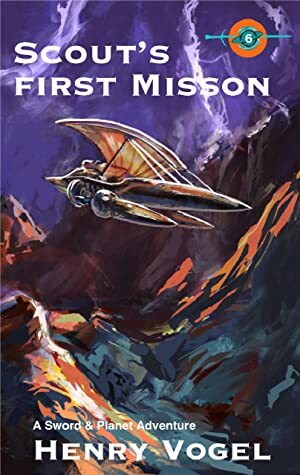 Synopsis
SynopsisNew marriage. New commissions. New mission.
Chris and Jade led a rescue mission to a new world, and Jade almost died. But Earth-like planets are rare and precious, so they came back.
They’re better armed and better provisioned. But all alone. Or are they?
Chris and Jade discover a lost human colony suffering under despotic rule. They’ve already broken laws they never knew existed. When the despots reject their neutrality, Chris and Jade are drawn into the middle of a conflict that’s been building for generations.
The commoners want them to lead a revolution. The rulers want them dead. Chris and Jade just want to survive their first mission.
Review of Scouts First MissionHaving read a couple other stories by this author before, I had a good feeling about whether I would enjoy it or not. Knowing the author basically writes modern versions of golden age pulp sci-fi, of the kind writers like E.R. Burroughs used to write, I had a feeling the story would be a fun, two-fisted, action-packed romp on a distant planet, with a wild assortment of characters and alien creatures. It definitely lived up to my expectations, since all those elements I mentioned are front and center.
While there are mentions of events in previous books, this is it’s own self-contained story arc, so reading this one out of order won’t take the reader out of the story. I’d still recommend starting with book one, Scout’s Honor, but hey, some people are just contrarians. With this book, you’ll get that classic sci-fi feel. A dangerous unexplored planet for the heroes of the story, Chris and Jade, newly minted Scouts First Class, and recently married to boot, to explore and make new discoveries on. The fact that they discover humans on an undiscovered planet comes as a shock, but in a universe set with a diaspora of lost colony ships from humanity’s first reaching into space, it is understandable. What else they find on this mysterious planet is unexpected, and Chris and Jade may have to be willing to stretch their orders and the meaning of self-defense to the breaking point in order to save lives and right some definite wrongs.
While not an overly complicated story by today’s standards, it is the kind of story that hooks a reader, immersing them in the world the author has created. Every story doesn’t need to be an epic galaxy-spanning journey to fight the evil emperor, sometimes its just a story of two young adventurers working to expand humanity’s knowledge. It doesn’t hurt that the story has lots of daring-do, evil villains, rampaging alien creatures, and heroic action that moves the story right along. John Carter would fit right into this kind of story, and fans of that classic era will definitely enjoy it. Fans of sci-fi, in general, should find something to enjoy in this as well. I highly recommend checking out this series.
Rating: 8.5/10 StarsCheck Out Scouts First MissionThe post Review – Scouts First Mission by Henry Vogel appeared first on BEFOREWEGOBLOG.
Review – Immersion Online: The Noob by Evan Klein
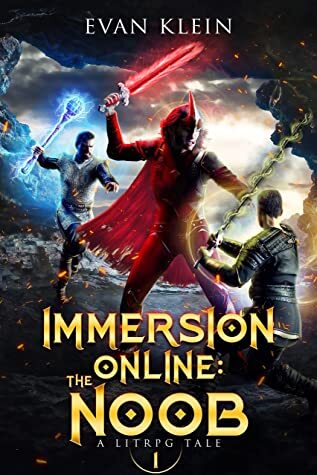 What is Immersion Online: The Noob About?
What is Immersion Online: The Noob About?Charlie Mason (AKA Mace) is a former detective for major crimes who is forced to retire. His former Captain offers him a job as an in game constable for the hottest virtual reality game around, Immersion Online. This down and out detective knows nothing of character creation, leveling up, or magical artifacts. He is a real noob. He spawns in the Wilderbrook – a group of human and humanoid villages hundreds of miles from the nearest city – to learn the ins and outs of the game before he assumes his role as a constable in Grandview – one of the largest city in The Great Realm. In the Wilderbrook, he and his new companions come up against an ancient evil. Mace is low level and way out of his league. But virtual world or not, Mace still has his wits and training as a detective. And he is going to need them!
ReviewI’ve been really lucky lately to get a chance to review some really good books. Immersion Online: The Noob, is no exception to that. I have to say, the author takes his world-building seriously. Set about 50 years from now, the real world of the book has a certain real tech billionaire turning 100, after accomplishing things like starting a colony and Mars and working on a space elevator. There are advances like nanite tech, which make death by things like heart attacks a thing of the past if administered in time. VR gaming is now commonplace, with full immersion finally being possible, although the gameplay is actually time limited to 12 hours in a row, to ensure people aren’t in game to the point they forget basic necessities. This is actually a cool point, looking at the real-world consequences of gaming too much. Not something a lot of stories deal with.
The characters really shine, especially the main protagonist, Charlie, who goes by Mace in game. After his forced retirement from the police, taking the job to become basically an in game cop is pretty funny, since he is not a gamer at all. He was also an old school kind of cop, more get the job done than worry about hurt feelings, so having to learn to work in a game world where cooperation is part of the game is hilarious to watch. Its a fun character arc to watch as Charlie discovers there is more going on in the game than he was led to believe, and he is now forced to discover just what the ghosts in the machine are up to. There is something boiling under the surface that is causing things that shouldn’t happen in the game and its a good thing Mace was a detective, because those skills serve him well throughout the game.
The secondary characters are a fun bunch. From his IRL boss, his old captain on the police force, to his various companions on his quests to level up in the game, there are a fun mix of personalities and skills that help compliment Mace’s skills, although being real people, they tend to make mistakes as well. The NPC’s are like nothing I’d ever seen before, since they are AI-controlled, and basically have free will within the game, so act like real people, with all the strengths and flaws that brings. They actually react like real people will, so it adds a whole new layer of realism.
The antagonists are kind of what you expect from a game world, a mix of fantasy baddies, although there is something going on in the background causing monsters and villains that shouldn’t be released in a noob area to appear and wreak havoc. I really enjoyed seeing where this went because seeing the characters go up against hopeless odds and still trying anyways is always one of my favorite things. The villains play very well against the protagonists and were darker than I expected in a LitRPG book. Good play by the author.
The audiobook narration is performed by veteran VO actor Todd Menesses. It is his usual excellent performance. He gives each character a life of their own, using various tones, cadences, and accents to differentiate the various characters. You are never in doubt which character is speaking, His narrative pacing is fantastic, never droning in a monotone or having a bunch of weird pauses. Like I said, an excellent performance.
While LitRPG might not be for everybody, I would like to challenge people to expand their horizons. This book has so many cool fantasy and sci-fi elements that the LitRPG elements shouldn’t distract. This is not a harem kind of wish fulfillment book, either, so no worries on that account. Its just a solid, fantasy-based book that should appeal to fans of both LitRPG and fantasy alike. I highly recommend it, because book two is due to be released later this month, so you won’t have to wait for your next fix.
Check Out Immersion Online: The Noob by Evan KleinThe post Review – Immersion Online: The Noob by Evan Klein appeared first on BEFOREWEGOBLOG.
May 5, 2022
Review – Beyond Redemption by Michael R. Fletcher
I am going to say straight away, this book is a masterpiece
“Beyond Redemption” is a book most people who enjoy what is commonly defined as the sub-genre of “grimdark fantasy” will definitely have heard of. As matter of fact, for many people, this book, written by the heralded author Micheal R. Fletcher, is seminal, and sub-genre defining.
 Mark Lawrence, New York Times Bestselling Author and grimdark star himself (author of the “Broken Empire” Trilogy), once defined Beyond Redemption as essentially the MOST grimdark book of all grimdark books, as voted on in a poll by readers. Among these books were some of Lawrence’s own books!
Mark Lawrence, New York Times Bestselling Author and grimdark star himself (author of the “Broken Empire” Trilogy), once defined Beyond Redemption as essentially the MOST grimdark book of all grimdark books, as voted on in a poll by readers. Among these books were some of Lawrence’s own books!
So there was no way that, despite my love-hate relationship with what is considered grimdark, I was not going to read this book, out of ALL the numerous so-called grimdark books that I could possibly sample.
Matter of fact, it was my desire to read this book specifically that inspired me to dedicate my reading in the month of April 2022 to reading four of the most lauded Indie grimdark writers, Fletcher being one of them. Thus, April 2022 became my #Grimdarkmasters reading month.
I am going to say straight away, this book is a masterpiece, all the more for the fact that, normally, this would not be my “type” of book.
“Beyond Redemption” is the first book in the aptly named Manifest Delusion Series. The book does something incredibly original (at least in terms of what I have read in fantasy) and turns mental disorders into the magical element of the book, which I found completely fascinating.
I recommend any reader, especially those who buy this book in physical form, as I did, go first to the very handy glossaries at the back of the novel that Fletcher has composed. They provide a helpful guide and explanation into the world he has created, based on the particular mental disorder (or magical abilities, which essentially translates to the same thing) each category of character in the book experiences. There is somewhat of a hierarchy of disorders / powers. One will need this to understand what control each kind of person could potentially exhibit over another, and what level of destruction and chaos could be wrought by whom. And believe me, there is a lot of destruction and chaos in the book.
The book’s central premise is that reality is defined by the strength of delusion. The more people believe in a particular delusion, the more power it holds over them, the more ‘real’ and the stronger overall the delusion becomes. Those who create the delusion that holds sway, thus, are the most powerful in terms of the overall society. One can become virtually a deity, if one’s delusions are powerful enough and believed by a widespread audience.
In this world, the most important people to remember are the Gefahrgeist and the Geisteskranken. The Gefahrgeiests are sociopaths, thus there is an absence of empathy or morality in them – they only want to conquer and rule. The Geisteskranken are essentially obsessive and “insane” enough that their devotion to a particular belief can actually change reality.
The plot of “Beyond Redemption” focuses on three main arcs. The most important arc, at first, seems to be that of High Priest Konig and Morgen. Konig is the prominent head of a religion / Theocracy – known as the Geborene Damonen – that believes humanity created gods out of a desperate need to believe in something. Based on this belief, Konig sees his penultimate mission as creating an all-powerful god to bring order to the world. That god is the young boy, Morgen, whom Konig feels he must train in god-like duties, and ensure that Morgen “ascends” to god-hood, in order to ensure Morgen achieves his full potential. But by ascending, that also means Morgen must die.
But Konig has more problems than making sure Morgen ascends. He is also a Mirrorist (or at least becomes one), and a Doppelgangist. Whereby Konig believes the reflections he sees in the mirror are – while still part of him – something other than himself, and that doppels of the high priest are working independently to their own sinister ends. A horrible fate could await Konig because of being a Mirrorist.
His reflections could try to escape being bound by the mirror, usurp his place, or murder him. He could reach the Pinnacle (the height of insanity where delusions have essentially taken over, and become one’s reality), where he might be dragged into the mirror by his delusions, unable to escape.
The second arc is that of three amoral thieves, and these miscreants see the opportunity to kidnap Morgen for their own big purposes as the final heist that will set them up for life. The scoundrels are Bedeckt, Wichtig, and Stehlen. Bedeckt is the leader, a formidable warrior and veteran, and seemingly one of the most sane people in the story, which makes him all the more dangerous, and confounding. The unbelievably good-looking and conceited Wichtig believes himself The Greatest Swordsman in the World, and is on a mission to prove it.
Meanwhile the complex Stehlen, who at times is the conscience of the team (which seems like a real contradiction) is a Kleptic (kleptomaniac) highly skilled killer. With all her savagery, she harbours unrequited romantic feelings for Bedeckt, while Wichtig looks to Bedeckt as a father figure and mentor. But despite all their daunting prowess, the three rascals are not prepared for the complications that go with trying to snatch a god from the likes of Konig and his followers.
The final arc is that of the repulsive Slaver Erbrechen, and his sometime rage-filled companion Gehirn. The Slaver has a cult-like following, and the desperate Gehirn, looking for affection, belonging, and above all, a purpose and outlet for her Hassebrand (pyromaniac) powers, perhaps pose the greatest threat to Morgen, and to reality.
There is some simply outstanding character work done here by Fletcher. This book has one of the best trio of characters in the band of travelling good-for-nothings variety I have ever read in a fantasy novel. The friend-enemy vibe between the three degenerates was priceless, laugh-out loud hilarious, and heart-breaking. Their chemistry was unbelievable, and my favourite part of the novel.
Konig, Morgen, Gehrin, Erbrechen, and particularly the doppels were phenomenally written, and completely chilling. If you are looking for characters that you are going to like for their virtue, look away. But this is part of the genius of Fletcher.
This is a book where, as the title implies, NONE of the characters have much good in them, if any at all, at least on the surface. Even the boy, Morgen, though he rates some compassion because of his youth, and vulnerability, is not a likeable character.
As a reader, the only reason I wanted him saved was due to tender age (and level of manipulation experienced at the hands of others), not because of particularly liking him. When strands of humanity, caring, and decency are found in the characters, any empathy felt by the reader will be potentially negated by all multiplicity of horrible acts they commit.
But when we do end up feeling sorry for them, we also have to look at ourselves, and see ourselves in them, and also contemplate the context of mental disorders, and those afflicted with them. The “average” person has some level of mental substance use disorder (some estimates say as high as a billion people, most of them undiagnosed and untreated).
Are not such disorders actually commonplace, rather than “abnormal”? How do mental disorders impact how people behave? To what degree can someone escape the impact of such disorders? Do people with such disorders not deserve more understanding, empathy, and consideration, rather than fear, rejection, and potentially loathing? Since, to some degree, one seventh of the world suffers from them?
Fletcher seems to raise the thought-provoking theme of what constitutes “reality”, whose “reality” matters, and ultimately, if there is something that exists after reality (hint, Fletcher describes it as the Afterdeath). For such a witty, gory, gripping book, with a twisty but fast-paced and tight plot, Fletcher excels at giving “Beyond Redemption” a highly philosophical feel, and keeps the subject matter very engaging. Characters pay for the consequences of their actions, there is lots of collateral damage, and it’s hard to comprehend if any of the partially “good people” have won at the end of the book.
But what an ending! The climax is shocking, riveting, and sets so much up for future installments.
The world-building was awesome, the action pieces thrilling, and with the themes outlined above, grimdark fans will be in utter delight, as Fletcher explores the depths of human depravity and madness. But nothing is gratuitous – it’s all purposeful, extremely well crafted, impeccably done, with appropriate sensitivity and aplomb.
Yes, there is nihilism, and yes, this book is bloody dark beyond belief! But the book does not wholly abnegate all sense of humanity. There is a tenderness and warmth to some of the interactions between the characters in some of the quiet moments (in the midst of utter chaos) that will really strike a chord, and indicates that perhaps the author indeed believes there is some hope of redemption for characters deemed otherwise not worth saving.
Finally, I was highly impressed by Fletcher’s prose. It flows beautifully, and has that great balance between being spare and tight while expanding enough and descriptive enough when needed.
My footnote here is that I, while I have read three books in my lifetime that I personally found are “darker”, than “Beyond Redemption”, “Beyond Redemption” is the one of the best books of what I consider grimdark books, and one of the pioneering books in the sub-genre.
Much more than five stars for this triumph by Micheal R. Fletcher.
Check Out Beyond RedemptionThe post Review – Beyond Redemption by Michael R. Fletcher appeared first on BEFOREWEGOBLOG.
Review – Galactic Outlaws by Jason Anspach and Nick Cole
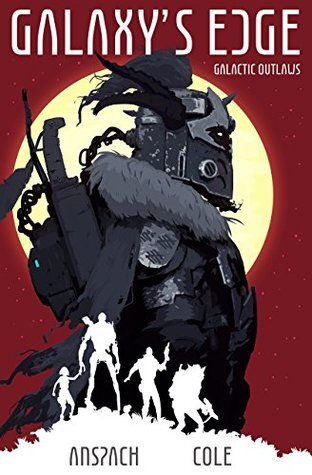 Years have passed since the battle of Kublar, and Wraith is in deep cover for Legion Dark Ops, living a second life on the edge as an irreverent smuggler and bounty hunter under the alias of Captain Keel. As he fights off pirates and double-crossing rebels, Keel comes to realize that the old lines between right and wrong have blurred as the Legion sinks further under the corrupting influence of the House of Reason and its points.
Years have passed since the battle of Kublar, and Wraith is in deep cover for Legion Dark Ops, living a second life on the edge as an irreverent smuggler and bounty hunter under the alias of Captain Keel. As he fights off pirates and double-crossing rebels, Keel comes to realize that the old lines between right and wrong have blurred as the Legion sinks further under the corrupting influence of the House of Reason and its points.
When a lucrative night market contract is offered directly to Wraith to hunt down an enigmatic warlord, the former legionnaire winds up on a galactic-wide search that brings him face to face with the galaxy’s most notorious bounty hunter, a living legend known as Tyrus Rechs. The pair soon discover that the man they both hunt is more powerful than either imagined… and is poised to overthrow the Republic.
With a cloud of darkness growing and a planet pitched in war, Wraith must choose whether his true allegiances lie with himself… or with his brothers still in the Legion.
Having been a fan of Nick Cole for years, I was excited to see what his team-up with Jason Anspach would lead to. The answer is Galaxy’s Edge, the wildly popular military sci-fi series starting with Legionnaire, and continuing with today’s review book, Galactic Outlaws. Picking up several years after the events of the first book, we are introduced to some new characters in a galaxy in turmoil, as well as seeing what one of the key characters from that book is up to.
This is where a chief strength of this book come in, the characters. We are introduced to the mysterious bounty hunter Tyrus Rechs, a guy who makes Boba Fett and the Mandalorian look like amateurs. When a young girl approaches him to help her get revenge on the people who killed her family, he is dragged into a conspiracy he could never have imagined. He helps the girl in spite of himself, especially dangerous as he has become a wanted man by the Legion, and even his knowledge and skills might not be up to the task. As the story progresses, you discover that Rechs has secrets that would be hard to imagine, and a tie to the villain that comes out of nowhere, but in a good way.
We also get to meet Captain Keel, a kind of roguish space captain who is reminiscent of a certain smuggler in another franchise in a galaxy far, far away. We do discover later that he is not exactly who he seems, and he is the character carried over from the previous book. He is dealing with threats from the Legion and criminals himself, and his crew of misfits and neer-do wells are the perfect compliment to him. As the story progresses, and the two threads of story come crashing together, we see that even with all the character’s abilities used to the fullest, it might not be enough to stop the threat that may just be bigger than all of them.
This leads into the world-building, which I was hooked on in the first book, and am impressed on how much more was added this time around. The universe it’s set in, with a fading republic beset by rebellion could be a tired trope, but its handled so well. As the authors said in the story, the universe is a dumpster fire, and as in any fading empire, the cracks are evident and are being exploited. The added element of an unknown outside threat only adds to the confusion of the characters, but really helps draw the reader in. It’s a high-tech universe, but the fading of the republic has caused some regression in technology and systems, and it’s interesting to see how this helps the story play out.
The narration is handled flawlessly by the super talented R.C. Bray. If you are unfamiliar with him, he narrated the original production of Andy Weir’s The Martian, and like that one, he is absolutely killing it on this one. He does such a good job bringing each individual character to life, and he really just draws you into the story. His narrative pacing is spot on, and it’s a real pleasure to just let the story roll into your mind.
With its action-packed plot, fun cast of characters, and creative world-building, this is a story that will appeal to a broad range of fans. It’s space opera in the best sense, and will just draw the reader in and keep them enthralled right up to the shocking action-packed ending. It’s the kind of book you’d be upset waiting for the next book in the series, but luckily, there are a lot of books following it ready for you to read. I highly recommend doing so.
Rating: 9.25/10 Stars
Check Out Galactic Outlaws by Jason Anspach and Nick ColeThe post Review – Galactic Outlaws by Jason Anspach and Nick Cole appeared first on BEFOREWEGOBLOG.



